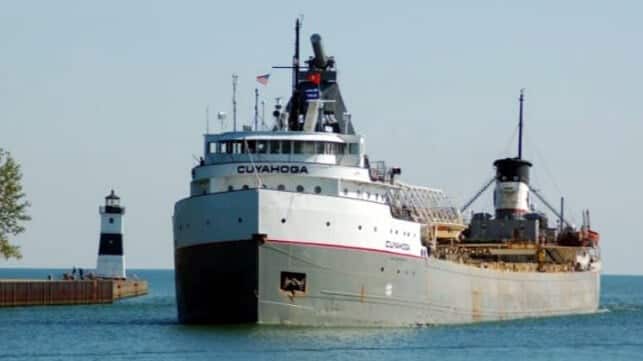TSB: Fuel Leak Due to Casual Repair Caused Fire on Canada’s Oldest Laker
Fire on Historic Vessel Sparks Safety Concerns

A recent report from the Transportation Safety Board of Canada (TSB) reveals alarming details about a fire that erupted on the Cuyahoga, Canada’s oldest operating vessel on the Great Lakes. The incident, which occurred on May 23, 2023, was attributed to a series of unresolved fuel leaks and inadequate repairs. The TSB’s findings raise significant questions about the safety protocols in place for aging maritime vessels.
Incident Overview and Immediate Response
The Cuyahoga, a historic bulk freighter built in 1943, was on a routine journey from Marblehead, Ohio, to Kingsville when disaster struck. Approximately three hours into the voyage, a fire ignited in the engine room, prompting the crew of 20 to spring into action. The vessel, measuring 620 feet and carrying 11,400 metric tonnes of granular crushed stone, faced a critical situation.
To combat the fire, the crew swiftly cut off the fuel supply to the main engine and attempted to activate the vessel’s carbon dioxide (CO2) fire suppression system remotely. Unfortunately, these efforts were unsuccessful. A subsequent attempt to activate the system locally resulted in flooding the cylinder room with CO2. Fortunately, the fire extinguished itself after the fuel flow ceased, and the vessel was anchored safely north of Pelee Island, Ontario.
TSB investigators later determined that the fire was caused by fuel spraying from a disconnected injection line onto hot surfaces of the engine’s exhaust gas piping. The report highlighted that retaining clamps, which should have secured the fuel injection lines, were not reinstalled after a previous repair. This oversight allowed engine vibrations to loosen the lines, leading to the dangerous fuel leak.
Investigation Findings and Broader Implications
The TSB’s investigation revealed a troubling pattern of casual repairs and inadequate maintenance practices on the Cuyahoga. Minor fuel leaks were routinely addressed without investigating their root causes, deviating from manufacturer specifications. The crew lacked access to updated maintenance guidelines, which contributed to the ongoing issues with the vessel’s engine systems.
Salvage Plan Prepared as Greece Warns of Oil Leak from Sounion
Excessive engine vibration was identified as a significant factor affecting the fuel injection lines. While some measures were taken to secure these lines, the absence of retaining clamps ultimately led to the disconnection of the fuel injection return line for cylinder 7, resulting in a spray of marine diesel oil that ignited.
Additionally, the TSB reported that the CO2 fire suppression system failed due to multiple factors, including damaged remote release cables and incorrect activation instructions. When the crew attempted a manual release, the system discharged CO2 into the wrong area, further complicating the emergency response.
Following the fire, the Cuyahoga was towed to Kingsville, where it sustained significant damage but fortunately did not result in injuries or pollution. However, the vessel faced another fire incident in March 2024 while docked in Ashtabula, ultimately leading to its retirement and scrapping in July 2024.
The TSB warns that the issues highlighted in this investigation are not isolated and pose a broader risk to marine transportation safety across Canada. In response, the TSB has initiated a national safety issue investigation to better understand vessel fire management and identify gaps in Canada’s emergency preparedness.
